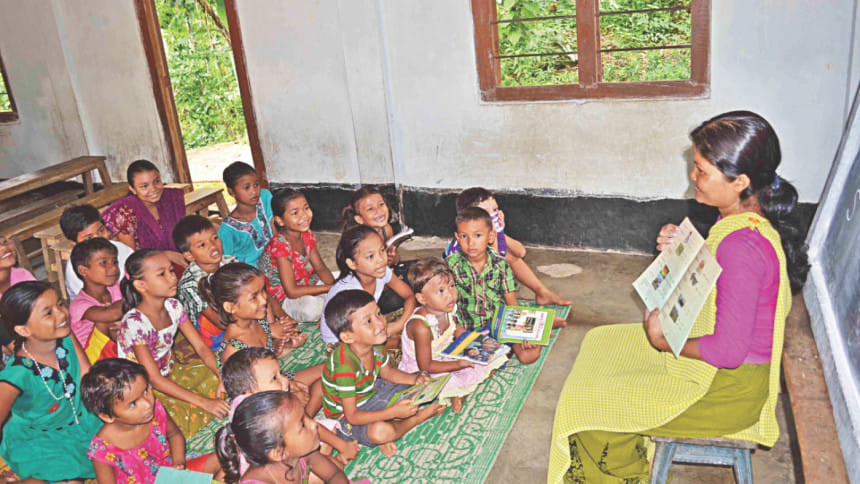Mother-tongue revival bid in Sylhet hills

That one's mother tongue is an indispensible element of self-identity is a truth which is readily understood in Bangladesh. Indeed, thanks to the importance of the language movement in this nation's history, Bangladesh was able to introduce 21 February as International Mother Language Day to the world.
In the spirit of protecting mother languages, contemporary efforts are underway in the Sylheti hills to revitalise and preserve three of the other languages of Bangladesh: Khasi, Mandi and Sadri, with Sadri being the shared mother tongue of the Oraon, Munda and Karia peoples.
Ridom Konglah is a Khasi student of Lamapunjee Education Centre in Sylhet's Guainghat upazila, who studies in class 1. "Reading books in my own Khasi language," he says, "gives new hope. It's not only me. All my friends enjoy reading in Khasi."
"I'm so happy I can read and write in my own language," says Lenika Dikhar, 9, who studies in class 2.
Rifilda Lymba, 8, of class 1 is thrilled to be able to recite Khasi poetry.
By tradition, Khasis are hill-dwelling farmers, famed for their betel leaf plantations. Historically, formal education did not have great prominence in their society; even a generation ago Khasi teachers were few. But things have changed: great strides are being made in furthering education as Khasis have come to better appreciate its value.
While the Khasi language was taught informally, in Bangladesh its Latin script written form in particular was endangered. From an absence of locally published Khasi books, the only books in the language had to be imported from India. It's quite a revival to have a new generation of Khasis formally trained in their written language.
"It's a great initiative," says school parent Silvestar Pathang, who is also a local council member in Kormodha union of Moulvibazar's Kulaura upazila. "Our community will greatly benefit from this."
Funded by the European Union and Caritas France, and implemented by Caritas Bangladesh since 2013, the Aloghar Project hopes to improve education access and quality through mother tongue tuition to eight communities in the Sylhet region.
The project involves the establishment of 38 education centres in remote villages, to support over 900 children up to class 2. According to Margret Sumer, Aloghar's technical officer, students learn better when tuition is in their mother tongue, since it facilitates understanding.
But teaching Khasi, Mandi and Sadri also helps students develop their talent in Bangla and English, which are taught side by side. "My teacher instructs in Khasi, and then translates into Bangla," says Dinim Kongwang, 10, who studies in class 2. "When she teaches in this way it's too easy to learn; it's why most students attend class regularly."
Head teacher at the Lamapunjee Education Centre, Rebeka Dikhar says Khasi students were not very motivated to read previously, but when they read in their mother tongue they become much more confident with reading overall.
In Kulaura's Puran Cholta Punjee Education Centre meanwhile, the language of instruction is Mandi; and at Mongrabosti Tea Garden Education Centre in Sreemangal, Sadri is taught. "I am very pleased that our children can learn in their own mother tongues," says Kulaura's primary education officer Shariful Islam.
Also supportive of the endeavour, Moulvibazar's district education officer notes the project is simultaneously helping to develop better maths and general language skills among enrolled indigenous children. "It gives new hope," he says, "for indigenous children to access higher education too."
According to Aloghar's regional manager, Pius Nanuar, plans are afoot for the project to be progressively expanded.

 For all latest news, follow The Daily Star's Google News channel.
For all latest news, follow The Daily Star's Google News channel. 



Comments